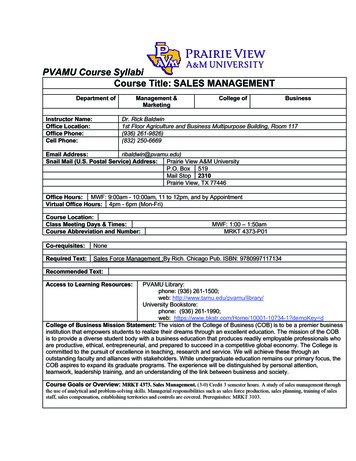
Transcription
MTD Sales TrainingThe Sales Manager’s Guidebook – Volume 1The Sales Manager’s Guidebook – Volume 1Welcome to Volume 1 of The Sales Manager’s Guidebook. In this volume we will look at sales planningand targeting, developing an appropriate management style, taking over new sales teams, managing thesales effort and recruiting and selecting sales staff.This resource can be used by Sales Managers to develop their own skills as well as Trainers wishing toproduce training sessions around the material contained in this volume.The volume contains information on each topic as well as checklists, exercises and team activities.Web: www.mtdsalestraining.com Tel: 0800 849 6732 Email: enquiries@mtdsalestraining.com2
MTD Sales TrainingThe Sales Manager’s Guidebook – Volume 1INDEXTopicPageThe Sales Manager’s RoleDevelopment Exercise 1 - The Sales Management RoleManagement StylesDevelopment Exercise 2 - Management StylesDevelopment Exercise 3 - The New ManagerTaking Over New Sales TeamsDevelopment Exercise 4 - The Sales ConferenceSales Planning & TargetingSales TargetingSales PlanningDevelopment Exercise 5 - Problem Solving QuizRecruiting & Selecting Sales StaffJob AnalysisDevelopment Exercise 6 - Job AnalysisJob Description ExamplePerson Specification ExampleJob Specification ExampleThe Job InterviewPreparing For The InterviewDevelopment Exercise 7 - Preparing For The InterviewDevelopment Exercise 8 - Action Planningpg 4pg 5pg 8pg 10pg 14pg 18pg 21pg 24pg 26pg 29pg 31pg 33pg 34pg 36pg 41pg 42pg 44pg 46pg 47pg 50pg 53Web: www.mtdsalestraining.com Tel: 0800 849 6732 Email: enquiries@mtdsalestraining.com3
MTD Sales TrainingThe Sales Manager’s Guidebook – Volume 1THE SALES MANAGERS ROLEA guide to the job of sales manager and how to assess where you currently areOne way to describe the Sales Management Role is that the Sales Manager achieves sales targetsthrough the effort of the sales team he or she manages. Within the overall definition of salesmanagement there are a number of key roles that can be identified that need to be carried out by amanager if he or she is to be judged competent.SALES PLANNINGAgreeing and setting objectivesAnalysing sales resultsAnalysing previous salesforce activityIdentifying business opportunitiesReviewing the marketSales ForecastingPlanning the sales effortProducing sales budgetsSALES MANAGEMENTRecruiting and selecting staffDeveloping sound procedures and systemsProducing Training and Development plansTraining members of the sales teamBuilding strong, successful teamsLeading and motivating team membersManaging Communications inside and outside the teamManaging time effectivelySellingSales accompanimentsDelegating appropriate tasksMaintaining high standards of disciplineReviewing sales team and individual performanceCounseling team members where appropriateIdentifying shortfalls in performanceCorrecting shortfalls in performanceAchieving sales team objectivesSALES ADMINISTRATIONMaintaining accurate recordsCarrying out correct reporting proceduresAchieving company administration standards(both personally and on behalf of the team)Web: www.mtdsalestraining.com Tel: 0800 849 6732 Email: enquiries@mtdsalestraining.com4
MTD Sales TrainingThe Sales Manager’s Guidebook – Volume 1DEVELOPMENT EXERCISE 1.THE SALES MANAGEMENT ROLEA look at how you currently approach to your jobFor each aspect of the Sales Management Role, listed below, mark your current performance against3 criteria.1. Your effective use of time2. Your understanding of this aspect of the job3. Your need for developmentSCORING SYSTEM1. For effective use of time, score marks out of 10, where 10 is fully effective and 0 is totallyineffective2. For understanding of the job function, score marks out of 10, where 10 is full understanding ofhow to perform the job function and 0 is lack of understanding3. For development needs rank each as being either (a) no need for further development, (b) needsfurther development, or (c), needs development as a priorityINTERPRETING THE RESULTSWhen you have completed the exercise you will be aware of your current use of time, understandingof the job and future development needsGo to the action plan at the end of the book and write down 2 ways in which you currently approachyour job, where you need to spend more time, and 2 ways where you need to spend less time. Forexample you might identify you are spending too much time selling and not enough time withmembers of your team.Pick out 2 aspects of the job where you need help in carrying out your day-to-day work. Discuss thesewith your managerRank your development needs in order of importance. The majority of these will be covered duringthis programme; however, your company may provide other training opportunities that could helpwith developing your skills.The exercise may leave you feeling dissatisfied with where you are currently, in terms of yourdevelopment. Don’t worry. Skills development takes a lifetime. The important thing is that you havebegun the process of self-development that will, in the long term, make you a more effectivemanagerWeb: www.mtdsalestraining.com Tel: 0800 849 6732 Email: enquiries@mtdsalestraining.com5
MTD Sales TrainingThe Sales Manager’s Guidebook – Volume 1DEVELOPMENT EXERCISE 1JOB ROLETime useUnderstandingof the jobDevelopmentneedsSALES PLANNINGAgreeing and setting objectivesAnalysing sales resultsAnalysing previous sales force activityIdentifying business opportunitiesReviewing the marketSales forecastingPlanning the sales effortProducing sales budgetsSALES MANAGEMENTRecruiting and selecting staffDeveloping sound procedures and systemsProducing training and development plansTraining members of the sales teamBuilding strong, successful teamsLeading and motivating team membersManaging Communications insideand outside the teamManaging time effectivelySellingSales accompanimentsDelegating appropriate tasksMaintaining high standards of disciplineReviewing sales team and individualperformanceCounseling team membersIdentifying shortfalls in performanceCorrecting shortfalls in performanceAchieving sales team objectivesWeb: www.mtdsalestraining.com Tel: 0800 849 6732 Email: enquiries@mtdsalestraining.com6
MTD Sales TrainingThe Sales Manager’s Guidebook – Volume 1SALES ADMINISTRATIONMaintaining accurate recordsCarrying out correct reporting proceduresAchieving company administrationStandardsWeb: www.mtdsalestraining.com Tel: 0800 849 6732 Email: enquiries@mtdsalestraining.com7
MTD Sales TrainingThe Sales Manager’s Guidebook – Volume 1MANAGEMENT STYLESHow management styles change and how to identify your preferred styleWhen we use the phrase management style we are normally referring to the ways in which differentpeople carry out the role of manager. Given the same job, it is likely that no two managers wouldprobably manage the job in exactly the same way. The two central aspects of management behaviourthat have been identified are task and relationship. Task being the emphasis placed on achievingwork results and relationship the emphasis placed on the well-being of people in work teams, theirmorale and general development.In extremes we can observe ineffective management styles:COMPLETELY TASK ORIENTATEDThe work being completed is everything to this manager, irrespective of the feelings or well-being ofthe people in the team. In the short term and in crisis this style can produce results, but longer term,focusing on nothing but the task can be counter productive. Team members fail to develop andgradually become frustrated and bored. Can you think of a manager you have known who displayedthese characteristics? What was that person like to work for and how successful was this style ofmanagement?COMPLETELY RELATIONSHIP ORIENTEDTaken in the extreme, this manager is less concerned with the job getting done, than with morale,team spirit and inter-team relationships. In the short term it can be fun to work for this type ofmanager but longer term, people need to feel successful and achievement of the task is aprerequisite for success. Have you worked with a manager who has displayed these characteristics?What was it like to work with him, or her, and how successful was this style of management?There is no right or wrong management style. Different styles will be more or less effectivedepending on: The maturity of the work team The situationAn immature work team, that is a new team that has recently been brought together, or one that isnot successful, will tend to respond better initially to a high task \ low relationship kind of style. Themanager tells the team what to do, when and how to do it and keeps a close eye on the team atwork.As the team matures and gets to understand its role and the various tasks it needs to perform it doesnot need such strong hands-on management and the manager can concentrate more on relationshipswithin the team, put less emphasis on overseeing the task and more on developing the skills ofindividual team members.Web: www.mtdsalestraining.com Tel: 0800 849 6732 Email: enquiries@mtdsalestraining.com8
MTD Sales TrainingThe Sales Manager’s Guidebook – Volume 1Gradually as the team becomes more ‘mature’ the manager can spend progressively less timemanaging the task and the relationship, and can begin to delegate more and give the team moredecision making authority, confident in its ability, to a large extent, to manage itself. This is a maturework team.However, even in mature teams the situation can change. The company, for example, could have asevere financial crisis in which case the manager may need to become more task oriented and lessrelationship oriented, making unpopular but necessary decisions.The lessons for new managers to learn is that:Most managers have a style of management they preferManagement styles should change to suit the situation and the maturity of the team.Web: www.mtdsalestraining.com Tel: 0800 849 6732 Email: enquiries@mtdsalestraining.com9
MTD Sales TrainingThe Sales Manager’s Guidebook – Volume 1DEVELOPMENT EXERCISE 2. MANAGEMENT STYLESRead the following case study, and then answer the questions on the following 2 pagesGraham Jackson has been appointed Regional Sales Manager for Scotland for the Britannia HouseInsurance Group based in Edinburgh. He has a team of 30 people working for him that includes adirect salesforce of eight people, a telesales team of five, administrative back-up, an assistant salesmanager and a secretary.He has come into the region at the worst time in its history. There has not been a permanentmanager on-site for 18 months and the team is lying bottom in the league table for both direct andtelesales. The quality of administration is woefully inadequate and morale within the team is rockbottom.He has a very strong authoritarian style and he is convinced that, given the strengths and weaknessesof the existing team, he can bring them success. He begins the process by imposing high standards inevery area of the business including discipline, dress, quality of written work, activity levels etc andmotivates the team leading from the front. Slowly but surely the teams’ results begin to improve.The team begins to regain its self confidence, there is real enthusiasm and the working environmentbecomes much more lively and positive, with Graham very much the hands-on leader involved indecisions at all levels.Graham continues to monitor every aspect of the team’s performance in detail demanding higherstandards all the time. The team continues to do well and is very soon out-performing other moretraditionally successful teams in other parts of the UK. Within 12 months they are lying third from thetop of the league table in direct sales and second in telesales. They have also won an inter-companyaward for good customer service.A few months later Graham is in his office reading through the activity reports for that week when hisassistant comes to him and says he has the chance to negotiate a contract with a major newcustomer in the area. If it comes off it will be a major coup for the region. Graham says: "Don’t worry.Leave it with me and I’ll sort it out".An argument develops and his assistant offers his resignation. Graham is taken aback. The assistanttells him that morale in the team is back at rock bottom and that others have told him they areactively looking for alternative employment. Graham loses his temper and accuses his assistant ofbeing disloyal."When I came here" he says "this team was the worst in the country and I have made it one of thebest. I work long hours for this team and all I get is complaints" His assistant leaves the room andGraham goes back to work checking final copies of all the office correspondence for grammaticalerrors and spelling mistakes. "Ungrateful" he says to himself, "that’s what they are, ungrateful".Web: www.mtdsalestraining.com Tel: 0800 849 6732 Email: enquiries@mtdsalestraining.com10
MTD Sales TrainingThe Sales Manager’s Guidebook – Volume 1DEVELOPMENT EXERCISE 2. MANAGEMENT STYLESBased on the information you have read, answer the following questions:1. Describe Graham Jackson's preferred management style?2. How effective was his style when he joined the region? Why?3. How effective is it now? Why?Web: www.mtdsalestraining.com Tel: 0800 849 6732 Email: enquiries@mtdsalestraining.com11
MTD Sales TrainingThe Sales Manager’s Guidebook – Volume 14. What is Graham’s problem now?5. What steps can he take to remedy the problem?6. If you were Graham's manager, what advice would you offer him?Web: www.mtdsalestraining.com Tel: 0800 849 6732 Email: enquiries@mtdsalestraining.com12
MTD Sales TrainingThe Sales Manager’s Guidebook – Volume 1DEVELOPMENT EXERCISE 2. MANAGEMENT STYLESHere are some answers to Graham's problem.Compare them with your own.Graham is almost totally task oriented. He is an excellent crisis manager because he is highly skilled atsetting standards and managing the task. He doesn’t worry if a few people get upset in the process aslong as targets are beaten and the team is efficiently organised and runWhen he joined the region he was highly effective because he gave members of the team very clearobjectives and set high personal standards of behaviour. After spending so long without successGraham’s approach was a breath of fresh air and morale within the team was restoredHowever, as the team achieved more success there was less need for him to check things in suchdetail, although every need to maintain high standards. His inability to delegate effectively meantthat people became frustrated in their jobs and the quality of their work began to suffer, along withdeterioration in team moraleHis problem now, is letting go. This does not mean abdicating responsibility, but recognising that theskill of a manager lies in achieving results through people. It is possible that he lacks confidence andneeds to recognise that if the team is going to continue developing he will have to give members ofthe team more responsibility and more of the credit for its successThere are several steps he could take to move things on. Firstly he could meet with his managers andsupervisors, as a group, and review progress to date and put together a plan for the future. He couldcarry out appraisals to review the individual performance of team members and begin the process ofdelegation in a structured way. He could also thank the team for their efforts and ask for ideas fromwithin the whole team to improve future performance. There are many things he could do, but willhe?His manager would benefit from spending time with Graham, seeing what he is doing on a day to daybasis, carrying out an appraisal with him, that will help Graham to recognise his strengths andweaknesses and hopefully help him realise he has a problem. Graham needs to understand that byletting go a little bit he will have more time to look after the development of the team and recognisefuture opportunities to make his team even more successful.Web: www.mtdsalestraining.com Tel: 0800 849 6732 Email: enquiries@mtdsalestraining.com13
MTD Sales TrainingThe Sales Manager’s Guidebook – Volume 1DEVELOPMENT EXERCISE 3. THE NEW MANAGERThis case study relates to a new manager taking over a sales teamAnn Watson has recently been promoted to Sales Manager, with a sales team based in the North Eastof England. She has previously worked in several parts of the country in sales and this is her first SalesManagement role. She is excited about the challenge of her new job and is anxious to achieve resultsas quickly as possible.Her predecessor was Tim Hartley, a longtime employee of the company, who had been in charge ofthe North East team for eight years. Tim Hartley was liked by his team despite being a hardtaskmaster. He had particular ideas about managing people, which basically meant that if you weredoing well he left you alone and if you were failing to achieve adequate sales results he would, in hisown words, "Come down on you like a ton of bricks".When Ann was interviewed for the post she was told that three members of the sales team had alsoapplied for the manager’s job. One of these people is a close personal friend of Ann’s family andthere is a strong possibility that Ann’s appointment might affect the relationship.Of the two others, one has rung Ann wishing her success and offering any help that Ann may need inher new role. Ann has heard on the grapevine that the other unsuccessful candidate for the job ismaking known his dislike for Ann and telling people that Ann is too inexperienced to follow in Tim’sfootsteps.Ann has spent three days in the job getting to know everyone in the office and the systems that are inplace. As yet, although she has spoken informally to members of the sales team, she has not metwith them formally. A sales meeting has been planned for five days’ time.Ann's Divisional Manager has told her that he feels that the North East team has become complacentand lazy. Results in the last six months have been poor and if they don’t improve there may need tobe a cost cutting exercise, that may involve staff reductions, both with administration and possiblywithin the sales team itself.Web: www.mtdsalestraining.com Tel: 0800 849 6732 Email: enquiries@mtdsalestraining.com14
MTD Sales TrainingThe Sales Manager’s Guidebook – Volume 1DEVELOPMENT EXERCISE 3. THE NEW MANAGERHaving analysed the situation, if you were Ann what would you do:1. immediately2. in the next two weeks3. over the next three months1. IMMEDIATELY2. IN THE NEXT TWO WEEKS3. OVER THE NEXT THREE MONTHSWeb: www.mtdsalestraining.com Tel: 0800 849 6732 Email: enquiries@mtdsalestraining.com15
MTD Sales TrainingThe Sales Manager’s Guidebook – Volume 1DEVELOPMENT EXERCISE 3. THE NEW MANAGERHere are some answers to Ann's problem.Compare them with your own:Ann should be careful not to make the common mistakes that are made by new sales managers. Sheshould first of all meet with her line manager and get her own objectives agreedShe should find out what she is expected to achieve and in what timescale. She should work with hermanager and prioritise her various objectives and negotiate how they will work together, what themanager’s information requirements are and what support might be available to herShe will then be best advised to spend time, as she has started to do, in looking at how the teamworks as a team, the systems that are in place and getting to know the people. At this stage it is oftena good idea to listen rather than tell and to avoid the temptation of reorganising all the systems untilshe is settled in the jobShe has called the team together for a meeting and this will begin the process of her gettingestablished as the manager. She should be careful not to try and win everyone over at the firstmeeting, as it is likely some team members will need time to adjust to her leadership styleOne good tactic for the meeting is to get team members to make presentations on their progress todate and give information on your overall objectives and plans for the future; being careful not toknock the previous regime. She can then give the team her overall objectives for the next few monthsand begin the process of defining and setting standards of performanceIf there are team members who are unhappy with her appointment, she should be careful not toattack them publicly at the first meeting. She might end up by uniting the team against her. Farbetter to meet with them individually and let them air their frustrations in private. She can get a verystrong message across at this stage that while she understands their frustration, everyone has a jobto do and targets to meetIf at a later stage they continue to cause problems, this then becomes a disciplinary problem that shewill have to deal with. She must, however, set high standards and keep to them. In the long term thiswill earn her the respect of the majority of the team and bring improved resultsOver the next 3 months, Ann can begin to implement change and work on developing the individualswho make up her team. In the early stages she should be task oriented and once the team begins toachieve better results, she can focus more on relationship issuesShe also needs to keep her manager informed of her progress and keep the team informed as to howthey are performing. Her style will be very much hands on and this will probably remain the sameuntil the team begins to really perform and achieve resultsWeb: www.mtdsalestraining.com Tel: 0800 849 6732 Email: enquiries@mtdsalestraining.com16
MTD Sales TrainingThe Sales Manager’s Guidebook – Volume 1The overall message to Ann is to take her time and not be forced into taking action without thinkingthrough her overall strategy. There is a Latin phrase that says festina lente, which means hurry slowlyand this represents good advice to anyone inthe position of taking over a new work teamWeb: www.mtdsalestraining.com Tel: 0800 849 6732 Email: enquiries@mtdsalestraining.com17
MTD Sales TrainingThe Sales Manager’s Guidebook – Volume 1TAKING OVER NEW SALES TEAMSWhen taking over a new sales team that you have not managed before, here are 20 ground rules thatcan help to improve your likelihood of success1. Take your timeAll new managers want to be successful and will quickly see changes that need to be made. However,success does not come overnight, so make a mental note to take your time before making changes orexpressing opinions.2. Understand why you were promotedYou were promoted because people felt you had the ability to be successful. It is natural to feelnervous when taking on a new challenge, however, be aware that most people will want you to dowell and help will be available both from inside and outside your sales team.3. Find out your objectives and timescalesDon't forget you have a manager who should be aware of what you are expected to achieve and howmuch time it should realistically take. You need a clear idea of objectives and priorities before takingon the role as sales manager.4. Manage the relationship with your managerThe ability to manage ‘upwards’ is equally important as the ability to manage downwards. Make bestuse of the knowledge and experience of your manager and don’t be afraid to ask for help if you needit.5. Get to know the teamManagement is about achieving results through people. Take time to get to know the team and avoidmaking snap judgments about people’s abilities. Avoid the temptation of making quick changes orexpressing opinions until you have had time to analyse the true situation. Be aware that the team willneed time to get used to you and your unique style.6. Find out how the team worksTake time to find out the systems and procedures used by the team. Again, avoid making commentsor changes until you have had time to study the whole situation.7. Analyse the teams resultsLook at what the team has achieved in the past. What does it tell you about the teams’ strengths andweaknesses? Are there areas of individual performance that may cause concern?8. Analyse how the team works as a teamObserve what goes on when the team is at work. How good is team spirit and morale? Does the teamhave common understanding of its goals? How much support does the team give itself? How can youinfluence the team as its new leader?Web: www.mtdsalestraining.com Tel: 0800 849 6732 Email: enquiries@mtdsalestraining.com18
MTD Sales TrainingThe Sales Manager’s Guidebook – Volume 19. Set high standards for yourself and the teamPeople respond well to high standards of performance in their manager and will perform much betterif they have a clear idea of what is expected of them. If you set high standards for yourself make surethey are attainable by others and that team members can see the benefits from having highstandards within the team.10. Explain what you want to achieveTell the team what you see as your vision for them and yourself. No matter where the team is now, ifit has a common view of where it is going there is a greater likelihood of the vision becoming areality. Ask for the team's views and ideas. The team is more likely to ‘buy’ your vision if it has achance to contribute its own ideas.11. Lead by exampleThis is a powerful way of influencing team behaviour. If you insist on good timekeeping for example,make sure you practice what you preach.12. Support Senior ManagementYou can enhance your credibility within the team by supporting the company and its decisions eventhough, at times, you may feel they have got it wrong. You are the main contact between the teamand senior management. An important part of your role is to ensure each knows how the other feelsand the team understands the reasons for decisions by senior management.13. Meet with the team individuallyOnce you have settled in to your new role take time to meet with individual team members. Find outtheir goals and aspirations. Communicate your vision to them and get their commitment to you andthe rest of the team.14. Encourage successThis can be done by praising positive behaviour within the team, but also by reprimanding teammembers who behave in a negative way. Praise in itself is not enough as a motivator. Lack ofdiscipline and failure to reprimand for negative behaviour can demotivate others in the team.15. Maintain high standardsHaving set standards for the team these should be maintained so that everyone in the team knowsthe ‘rules’ and sticks to them. If you set high standards there is a good chance they will be achieved.(This is equally true of low standards!)16. Be sensitive to the needs of the teamPart of a competent manager’s job is to be aware of how the team is feeling at any particular timeand to understand that the team is made up of people, not machines. There may be conflict betweensupporting senior management and looking after the interests of the team. This makes the manager’srole challenging and worthwhile, but never easy.17. Manage inter-team relationshipsTeams do not work in isolation. They need the support of other teams in the organisation to besuccessful. Develop your network of managers and others and encourage the team to do likewise.Web: www.mtdsalestraining.com Tel: 0800 849 6732 Email: enquiries@mtdsalestraining.com19
MTD Sales TrainingThe Sales Manager’s Guidebook – Volume 118. Pay attention to detailSuccessful managers know what is going on in their teams and pay particular attention to detail. Thisimproves the overall quality of their work and keeps the team on its toes.19. Involve the team in goal settingWherever possible give team members the opportunity to contribute to the goal setting process. Thisincreases the commitment of the team to its own success and helps build team spirit and morale.20. Give regular feedback to the teamTell the team, as a whole, and individual team members how they are doing. This is a positive aid tomotivation and helps to encourage repeat behaviour. Also, get some feedback about how you aredoing. It can feel uncomfortable at first, but is a powerful tool for your own self-development.Web: www.mtdsalestraining.com Tel: 0800 849 6732 Email: enquiries@mtdsalestraining.com20
MTD Sales TrainingThe Sales Manager’s Guidebook – Volume 1DEVELOPMENT EXERCISE 4. THE SALES CONFERENCEThe following activity can be used at team meetings to improve inter teamrelationships and communication skillsTo carry out this team exercise break the team into groups of 3, or 4 people, plus an observer andannounce that you have a problem for them to solve and the team that gets the first correct answerwins.Here is the problem:John Smith is a Sales Manager and he has 5 people in his sales team:Alan JonesMary BakerJudith ArmerHarry LonfieldKeith McShaneThey all attended a conference recently and were allocated 6 seats, in the front row.They were given numbers 3 to 8.You have 20 minutes to work out, from the4 pieces of information supplied, who sat next to who.There is only one possible solution.1. Alan sat next to Judith in a higher numbered seat.2. Keith was not in seats 3 or 8.3. John’s seat was 2 numbers higher than Harry.4. Mary’s seat number was odd and Judith’s even.Web: www.mtdsalestraining.com Tel: 0800 849 6732 Email: enquiries@mtdsalestraining.com21
MTD Sales TrainingThe Sales Manager’s Guidebook – Volume 1DEVELOPMENT EXERCISE 4. THE SALES CONFERENCEIn your group, answer the following questions about the previous exercise:1. How did your group go about solving the problem?2. What actions, within the group, helped to solve the problem?3. What actions made problem solving difficult?4. If you were given the problem again how would you go about solving it?Web: www.mtdsalestraining.com Tel: 0800 849 6732 Email: enquiries@mtdsalestraining.com22
MTD Sales TrainingThe Sales Manager’s Guidebook – Volume 1DEVELOPMENT EXERCISE 4. THE SALES CONFERENCESOLUTIONThe problem cannot be solved just
direct salesforce of eight people, a telesales team of five, administrative back-up, an assistant sales manager and a secretary. He has come into the region at the worst time in its history. There has not been a permanent manager on-site for 18 months and the team is lying bottom in the league table for both direct and telesales.










